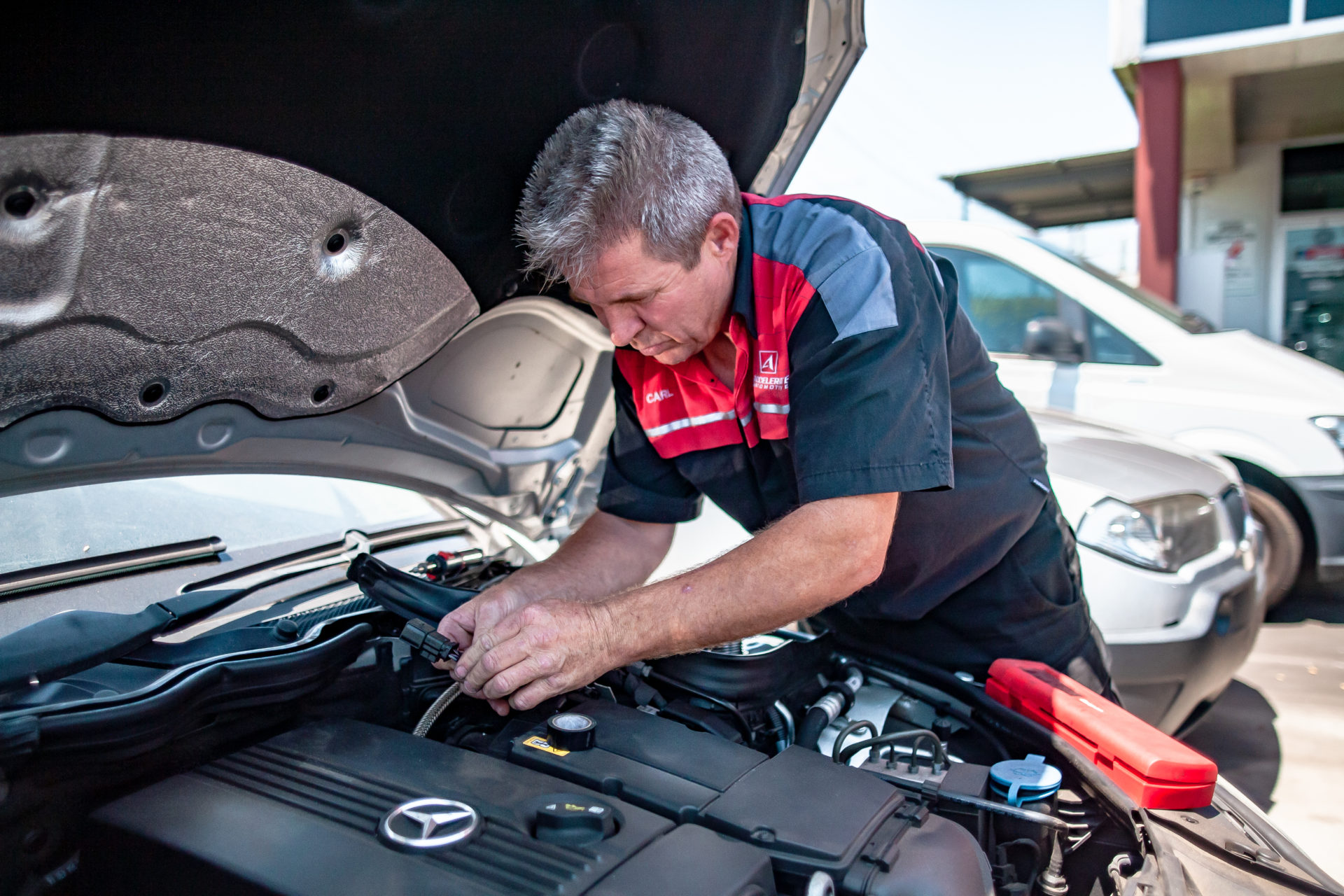Ask The Mechanic
-
Why do I have to replace my brake disc rotors when all I need is just brake pads?
At each service, your vehicles brakes are checked by way of a visual inspection and on-road inspection. In addition to these testing methods your brakes are checked via our SafeTstop. When the visual inspection is carried out of your brakes we inspect how much of the brake pad compound is remaining and we measure the thickness of your disc rotors.
Most times when your vehicle requires brakes to be replaced, only your brake pads will replacement. If your disc rotors are requiring replacement this will be due to either the disc rotors being below minimum thickness or because they warped. If the disc rotors are warped, you'll usually be feeling shudder when your vehicle is braking.
For our European customers, you will usually require new disc rotors every second brake pad change.
-
How often should I service my car?
So, what’s the magic number? Well, most car manufacturers suggest every six months to a year or every 10,000kms, whichever comes first. But keep in mind, this is just for an average vehicle. Cars that perform more heavy duty tasks are advised to have more frequent services. Plus, if you drive an older car, it might be worth booking in a little earlier and keeping a close eye on your odometer. Good mechanical repairers should look at your car and individually diagnose it (just like if it were a person going to the doctor - everyone’s different!).
-
Why does my engine light sometimes go away after i turn the car off then back on?
The Check Engine Light is a signal from the car's engine computer that something is wrong in one or more of you electronic components that your vehicle has. A quick and simple process to try, is to safely get your vehicle off the road, turn off of the ignition and turn it back on again. This will restart your vehicles computer which will reset you engine light. This is very similar to when your computer or mobile phone isn't working as it should, we simply turn it off and back on again. Should the engine light return immediately contact your mechanic and discuss how best to proceed.
Whilst your engine light may reset, when the car has been turned off, this does not mean it won't return. Therefore it is always advisable to contact your mechanic to arrange a time to have a diagnostic scan carried out to check what the fault was as this will be stored in your engine computer.
-
Why is my engine light on?
Let me guess you're driving along minding your own business and the dreaded "Check Engine Light" has come on? What does it mean? What is wrong with my car? Why do these things happen at the most inconvenient time? Well we wish there was a one simple answer for the dreaded "Check Engine Light"......but it's not that simple.
We would love to be able to tell you right here, right now; what your engine light means and why it has come on. Unfortunately though, with most cars, a "Check engine light" can mean many things. The check engine light — more formally known as the malfunction indicator lamp — is a signal from the car's engine computer that something is wrong in one or more of you electronic components that your vehicle has.
Is it safe to keep driving? Without carrying a diagnostic check of your vehicle this is very hard to determine. It is best to seek professional advice before proceeding. We will run you through a series or questions to determine whether it is possible to keep driving. Our best recommendation is if you're unsure arrange for your vehicle to be towed, this will provide peace of mind and save you money on causing unnecessary damage to your vehicle.
-
How often should I have a wheel alignment?
The overall aim of a wheel alignment is to set your vehicles steering and suspension geometry to ensure maximum tyre contact with the road under actual driving conditions. We highly recommend a wheel alignment be carried out if:
- You've had new tyres fitted to your vehicle
- You've had any suspension work carried out to your vehicle
- If your steering is pulling to one side on a straight road
- If you've noticed your tyres are wearing out faster than normal
- If you've hit a pot hole, gutter or any obstruction on the road
Did you know you can maximise your fuel consumption by minimising tyre drag? Included in every service we carry out, your vehicle tyre drag is tested via our SafeTstop. Therefore your wheel alignment is checked on a regular basis, so if you haven't had any unexpected mishaps you should not need a wheel alignment in between services.
-
What should my tyre pressures be kept at?
The tyre pressure that your vehicle should be maintaining is usually located on the tyre placard that is located on the inside one of the front door openings of your vehicle. The owner's manual should also have the correct tyre pressures for your car. The tyre pressure for the front and the rear tyres can differ.
-
How often should I check my tyre pressures?
We recommend you check your tyre pressures once a month. Simply pop into your local service station and:
- Unscrew the cap on the air valve of your tyre.
- Push your tyre pressure gauge firmly onto the tyre valve.
- Look at the pressure reading on the gauge.
- If the reading is low, attach the air hose to the tyre valve and increase the pressure to the correct level, rechecking with your own gauge if necessary.
- Screw the cap back onto the tyre air valve.

